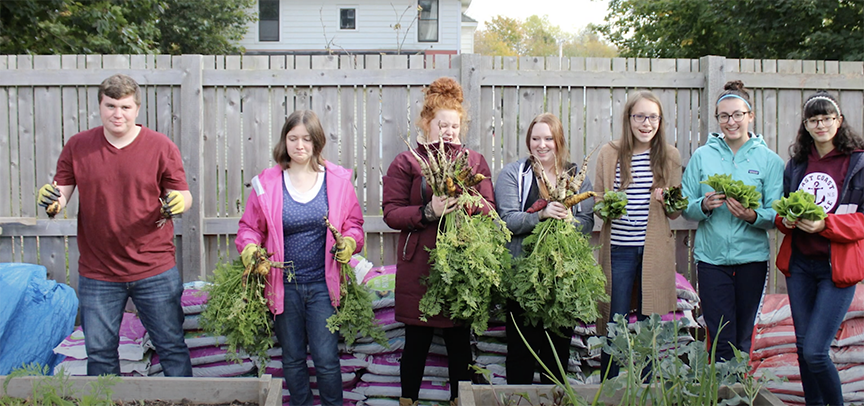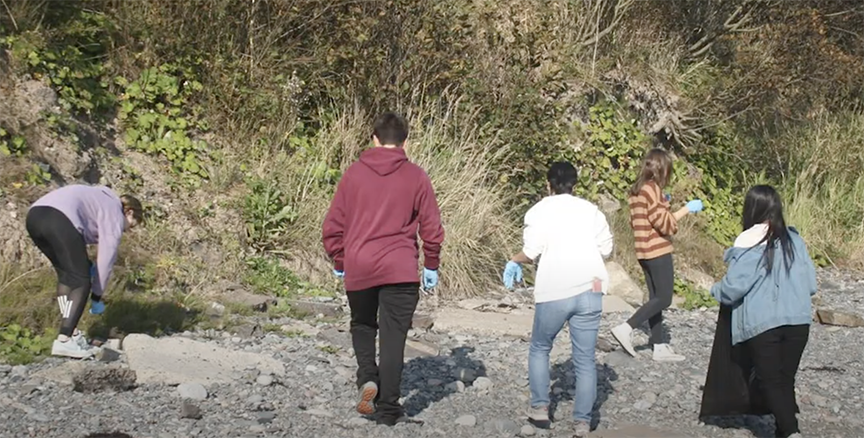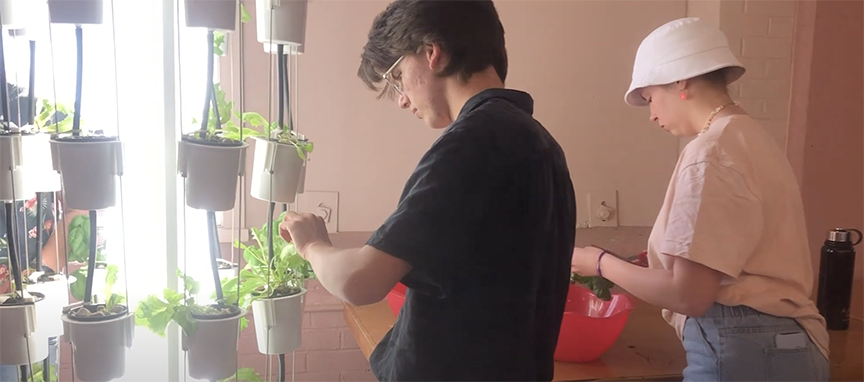Photo: Georgia (Grade 10), Aidan (Grade 11), Joanna (Grade 10), Olivia (Grade 10), Paige (Grade 11), Ben (Grade 11), Ruhamma (Grade 12)

Harbour View High School, Saint John, NB
Grant term 2020-2022
In September 2018, a group of twenty-three students formed a Climate Action Group within our school. Their vision was ambitious and wide-ranging. They wanted to ensure that every person in our building (students and staff) considered the consequences their actions had upon the environment.
We believed (and still believe) that peers supporting peers to make small but meaningful lifestyle changes is essential for the survival of our planet. We planned a varied and broad-based approach that addressed the issue of wasteful practices in our school building, encouraged communication with local and provincial government, ensured an appreciation of the beautiful natural setting of our school, and made climate action a way of life for everyone in our building, not a special interest that was only relevant to students in our Environmental Science class, the gardening club, and our Envirothon group. Our organic garden has always been at the heart of our efforts.
Today, our club consists of 67 active members. The original leaders have graduated, and we have a leadership team of seven students. We work diligently to remain true to our original vision, to battle the feelings of helplessness that some students feel in the face of continuous global disasters, and to educate students who do not understand the need for change. We have had setbacks, but we are proud of our successes, and continue to believe that our planet can be saved by community action.

Our first action, in 2018, was a letter-writing campaign. We managed to convince 230 of our 850 students to write to our premier suggesting that plastic bags be banned in New Brunswick. These letters were all original and individualized, full of specific evidence and concerns, hand signed and had students’ home addresses. When, six months later, our school received a vague three-line email reply suggesting that our opinions would be considered, we were not deterred, but chose to focus on the educational benefits of the videos we had shown and the information we had given about the impact of plastic on our eco-system.
We also worked to reduce waste within our building. We had milk crates donated from a local dairy, covered them with fabric remnants and created attention-catching signs to let students know that these would be receptacles for paper that only had print on one side. We then sourced attractive reusable notebooks made from recycled material so that students could use this paper for sketching or note-taking. We created “turn off the lights” stickers for classrooms and have worked with our custodial staff on this issue.

For years, our cafeteria used paper plates, and plastic utensils. We met frequently with them to try to address this issue, and the challenges with staffing and hygiene that re-usable dishes would pose. We learned a lot through this process and developed a plan involving student volunteers, students from our life skills class, and Chartwells’ (our cafeteria provider) employees. We purchased dishes, cutlery, and bussing carts from a restaurant that was closing and felt ready to commit to eliminating single-use dishes. Chartwells felt they could not make a profit during the pandemic, so we have been using these dishes for our wellness meals- monthly events where we encourage students to try food grown in our organic gardens, by giving out free soups, salads, and smoothies.
Our garden is the heart and soul of our school and without the support of Farm to Table, it is difficult to see how we could have maintained this beautiful space. Over 20 years ago, our school district abandoned the core staff of school gardens, and we were left with an empty greenhouse. Our incredible environmental studies teacher cleaned the neglected building and motivated a group of teachers to work tirelessly over the summer months to clear unused land beside it for a vegetable garden. For the past seven years, we have grown vegetables and fruit to provide ingredients for our cafeteria, culinary technology classes, and our free lunch program, The Sunshine Café. Now that we are unable to sell to Chartwells, we are struggling to finance the garden, but have been successful with some small grants and voluntary contributions. We used a portion of your grant (and money allocated to the science department budget) to purchase large hydroponic towers to grow greens and herbs throughout the winter months. Our Advanced Placement Computer Science students became fascinated by the towers and spent months last winter constructing a large hydroponic unit linked to a raspberry pi which monitors delivery of water, and nutrients. We have held video meetings with local middle and elementary schools that are considering using hydroponic gardens, and our science and technology teachers have used the towers as teaching tools. Over the summer, we will continue to grow vegetables in our outdoor garden but will use the hydroponic units to germinate milkweed.

We are collaborating with the Saint John Naturalists Club on a pollinator garden. Our grade nine science classes watched an excellent presentation from club members on the migration of monarch butterflies and our students have been given the incredible opportunity to join in fieldwork, tagging monarch butterflies on hiking trails near our school. The club also brought in a gripping guest speaker for our upper-level students about the plight of the right whales in the Bay of Fundy, and we organized an evening at Cineplex to watch the film, The Last of the Right Whales. We were astounded that 50 students gave up time on a long weekend to join us. The discussion after the movie was really thoughtful.
We also collaborate with the Atlantic Coastal Action Program (ACAP) who have provided us with materials for beach clean-ups and supplied us with 40 trees to plant in a park in a priority neighbourhood. We also have installed Lint Luv’rs , an addition to our school’s washing machines, that help us monitor microplastics in our laundry, giving us a tool to educate our peers about the harm microplastics are causing.
One of our members shared his Advanced Placement presentation on the harm fast fashion does to our planet, and that led our club to take on a Christmas campaign to shop in thrift shops. That was so successful that we started a series of pop-up thrift shops at lunch and gave out prizes for the best dressed thrifters on Earth Day. Our school has always encouraged alumni to donate gently used prom dresses for students in need, but this year, we placed the emphasis on the benefit to the environment rather than financial need. Our “say yes to the dress” prom room is beautiful and has supplied dresses to over 40 students this year.
Our leadership team meets at least once a week and we host two large club meetings a month, with many sub-committees that allow students to pursue eco-volunteerism in areas that most suit their talents and interests. Our final meeting in June will be a hike in a local nature park followed by a vegetarian picnic. We will share the gardening chores over the summer and re-group in September to take on new challenges. ACAP have applied for a grant to allow us to help other local schools to set up their own Climate Action Groups, and we are really hopeful that will help us to grow this movement.
Trying to change people’s behaviour during a global pandemic has not been easy. Our biggest heartbreaks occurred when we had to abandon our food composting program because our school district and landfill had concerns about contamination, and when our cafeteria closed. Trying to juggle distancing, sanitation and constant change has been a challenge, but it is one that we faced with smiles on our faces. But, there have been so many positives. Many school activities were cancelled; our club was able to keep going. Students whose lives would have been consumed by sports, drama, or music joined our efforts, and even if their time becomes consumed with other activities again, their hearts will always be with us. Having money to hire grade nine students over the summer and purchase essential materials has been a godsend. We are working on a food service plan and hope to evolve a food program that addresses climate change, nutrition, and food insecurity. Your support throughout these difficult years has given us hope and a lifeline.




